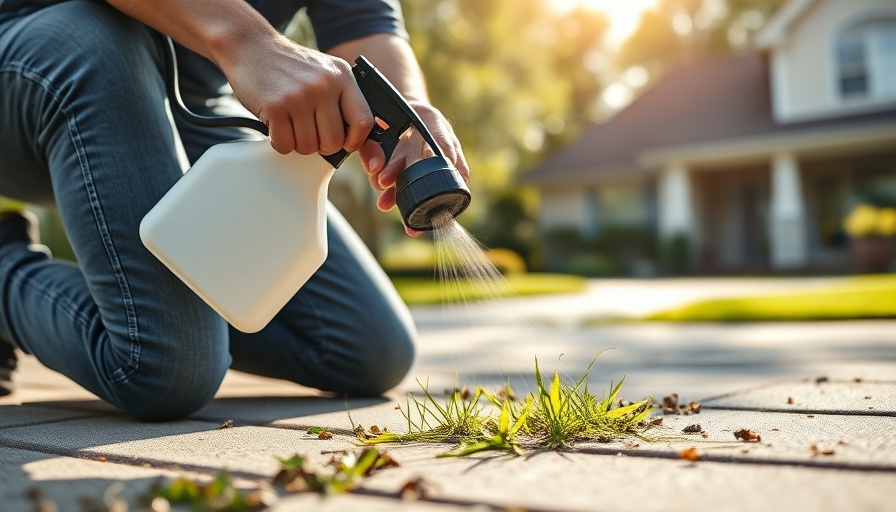
Is Vinegar Truly a Weed Killer?: Understanding the Basics
Commonly perceived as a natural herbicide, vinegar has garnered attention for its potential to eliminate weeds in a garden. However, a closer examination reveals a plethora of factors that affect its efficacy. With household vinegar containing only about 5% acetic acid, it tends to scorch the tops of plants, but this often leaves the roots intact, allowing for regrowth. In contrast, products designed for agricultural use can contain concentrations of acetic acid between 10% to 20%, significantly increasing their herbicidal effects. The use of vinegar for weed control has sparked conversations about its ecological benefits and potential downsides.
The Science Behind Vinegar and Weeds
Vinegar works to control weeds by affecting the cell membranes of plants, causing dehydration and wilting upon contact. This reaction is particularly effective with annual broadleaf weeds, especially in warm weather conditions when the sun is shining. Larger and perennial weeds with stronger root systems often survive initial applications and require repeated treatments. A research summary indicated that higher concentrations coupled with increased application volumes yield better results against stubborn weeds. However, no long-lasting residual effect means persistent monitoring and reapplications are critical for controlling weed populations.
The Growing Demand for Natural Alternatives: Vinegar vs. Glyphosate
With rising concerns surrounding chemical herbicides like glyphosate, which has been under scrutiny for its potential health risks, many homeowners are gravitating towards natural alternatives. The University of Maryland Extension discusses how vinegar could serve as a viable alternative to glyphosate in certain contexts. Unlike glyphosate, which acts systemically to kill weeds from the roots, vinegar primarily targets foliage, making it essential to use it judiciously and at the right time for optimal effectiveness. Organic solutions such as vinegar appeal to eco-conscious gardeners, but challenges remain in balancing efficacy with safety, particularly for persistent perennial weeds.
Maximizing Vinegar's Effectiveness: Best Practices
For gardeners interested in leveraging vinegar as a weed killer, understanding best practices is crucial. Here are some proven strategies to enhance its effectiveness:
- Timing Matters: Apply vinegar to young weeds that have recently germinated (1-2 leaves).
- Combine with Surfactants: Mixing vinegar with a surfactant such as dish soap can help the solution adhere better to the leaves, improving the kill rate.
- Frequent Applications: Plan for multiple applications, as vinegar doesn’t kill the roots, particularly with perennial weeds. Repeat treatments every two weeks may be necessary.
- Know Your Weeds: Target broadleaf and annual weeds effectively; however, recognize that larger and perennial weeds may require different management approaches.
- Consider Environmental Conditions: Apply on sunny days with low humidity for optimal results, as heat helps the vinegar work faster.
What Homeowners Should Know: Weighing Pros and Cons
Household vinegar is heralded as a low-cost alternative for homeowners seeking a natural weed control method. While it’s non-toxic and poses lesser risks than synthetic options, its limitations cannot be overlooked. The effectiveness greatly diminishes against tougher weed types, making it essential to understand both the benefits and drawbacks before fully relying on vinegar.
-
Pros:
- Non-toxic composition makes it safer for pets and children.
- Affordable and easily accessible.
- Can be used successfully in small, targeted areas.
-
Cons:
- Limited effectiveness on perennial weeds due to the lack of root destruction.
- Non-selectivity can harm desired plants if applied carelessly.
- Requires repeated applications, increasing costs over time.
Alternatives to Vinegar: Exploring Other Natural Methods
For homeowners seeking alternatives to vinegar, other natural solutions can be explored. Methods like pouring boiling water on weeds or using Epsom salt can effectively manage unwanted plants without the drawbacks associated with vinegar. Other promising candidates for natural weed control include:
- Boiling Water: Effective for killing surface plants immediately.
- Mulching: Prevents sunlight from reaching weed seeds, discouraging growth.
- Salt: A potent method for driveways but should be used carefully, as it can degrade soil health over time.
Ultimately, knowing when to engage professional help is vital. As the article from Native Pest Management suggests, if a weed issue persists despite natural efforts, considering professional treatments can ensure effective long-term management.
Conclusion: The Journey Towards an Eco-Friendly Garden
While vinegar can serve as a useful component in the organic gardener’s toolkit, it’s important to assess its limitations and be prepared to adapt strategies as necessitated by the weeds encountered. The choice of weed management methods should abide by both ecological considerations and practical outcomes—offering not only solutions but preserving the health of the environment.
For those who are ready to explore professional lawn care options if vinegar and other DIY methods prove ineffective, engage with a licensed pest management service that caters to your specific needs and landscape.
 Add Row
Add Row  Add
Add 




Write A Comment